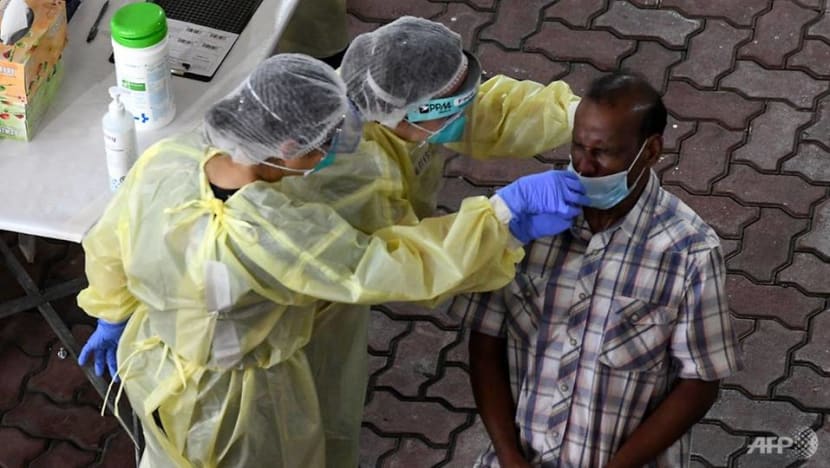COVID-19 rostered routine testing scrapped for all workers from Mar 29

A health worker takes a COVID-19 nasal swab test sample from an essential worker in Singapore, Jun 10, 2020. (Photo: AFP/Roslan Rahman)
SINGAPORE: Workers in all sectors will soon no longer need to undergo rostered routine testing (RRT), the Ministry of Health (MOH) said on Thursday (Mar 24).
This will start from Mar 29, and is part of a further optimisation of testing strategy as the COVID-19 situation eases, the ministry said.
"The high vaccination and booster coverage among the sectors still on RRT, and their strict compliance to their specific safe management measures are sufficient to protect the individuals within these sectors, now that we have passed the peak of the Omicron wave," MOH said.
MOH had already from Feb 18 narrowed RRT requirements to only workers in healthcare, eldercare and those who work with children below five, as well as some essential service workers.
Previously, the requirement applied to groups such as border frontline workers, transport workers, dormitory-dwelling workers, service industry employees, as well as those working with children under 12.
"As part of our shift in focus towards protecting the vulnerable and in view of the reduced effectiveness of RRT in containing the Omicron variant given its shorter incubation period and higher transmissibility, we had earlier streamlined RRT to apply only to settings catering to vulnerable groups and selected essential services sectors," the ministry said on Thursday.
With the full removal of RRT requirements, MOH said it will on Tuesday also end government subsidies provided for companies for RRT.
Employers and businesses that want to impose regular testing at the workplace at their own cost may continue to do so, it said.
"Individuals are still encouraged to self-test when they feel unwell or had recent contact with an infected person, and to follow the necessary health protocols if they test positive," it added.
"Companies should continue to allow their employees to rest at home from their COVID infection if they test positive, without the need for a medical certificate or recovery memo."
Related:
ALLOWING YOUNGER COVID-19 PATIENTS TO RECOVER AT HOME
MOH also announced that COVID-19 patients aged 12 months to two years old will be managed under Protocol 2 by default, either at home or under the care of their primary care physicians or paediatricians, from Friday.
"This means they no longer need to be hospitalised by default and may recover at home supported by family physicians," said MOH's director of medical services Kenneth Mak at a press conference on Thursday.
Under Protocol 2, COVID-19 patients who are well and tested positive, or have been assessed by a doctor to have a mild condition, self-isolate at home for a minimum of 72 hours and can resume activities once they test negative with an antigen rapid test.
Local clinical data collected during the Omicron wave indicates that most children in the 12 months to two years old age group also experience mild symptoms and recover uneventfully in the community, MOH said.
"Hence, in consultation with the paediatric specialist community, MOH will now expand the eligible age band," it said.
"We had earlier allowed patients aged three to 69 years to recover at home under Protocol 2 regardless of vaccination status, as the vast majority of people in this age group can recover safely on their own," MOH added.
MIGRANT WORKERS CAN VISIT COMMUNITY WITHOUT TAKING ART
Moving on to migrant workers living in dormitories, MOH said these workers will not need to do an ART before visiting the community.
MOH had from Mar 15 increased the quota of community visit slots for vaccinated migrant workers from 3,000 on weekdays, and 6,000 for weekends and public holidays to 15,000 and 30,000 respectively.
This quota will remain the same, the ministry said, adding that unvaccinated migrant workers would still not be allowed to visit the community to "safeguard" them against infection.
From Apr 1, vaccinated migrant workers will also no longer need to apply for exit passes to visit recreation centres. Only unvaccinated workers must continue to apply for exit passes and take a pre-visit ART before visiting the recreation centres, MOH said.
BOOKMARK THIS: Our comprehensive coverage of the COVID-19 pandemic and its developments
Download our app or subscribe to our Telegram channel for the latest updates on the coronavirus pandemic: https://cna.asia/telegram



















